- Skip to main content
- Keyboard shortcuts for audio player

The U.S. seized Russian oligarchs' superyachts. Now, American taxpayers pay the price

Ayesha Rascoe
Ayesha Rascoe speaks with Stephanie Baker, senior writer at Bloomberg News, about the complications involved in seizing and maintaining superyachts owned by sanctioned Russian billionaires.
AYESHA RASCOE, HOST:
When the U.S. and its allies looked for ways to sanction the Russian elite, they zeroed in on their superyachts, filled with luxuries like heated pools and wine cellars. But as Stephanie Baker reports, the powerful symbolism of seizing a superyacht is followed by the expense of maintaining those pools and wine cellars and everything else aboard these floating palaces. Stephanie Baker is a senior writer at Bloomberg News, and she joins us now. Thanks for being with us.
STEPHANIE BAKER: Thanks for having me.
RASCOE: So you've written a series of articles on the West's seizure of these yachts from Russian oligarchs. What have you learned about what goes into maintaining these types of boats? Like, you can't just let them sit at the dock?
BAKER: No, it's not a case of turning off the lights, locking up the door and leaving them until the war in Ukraine is over. These things take an enormous amount of money to maintain. Even stuck in ports, they have to be staffed with a, you know, minimal crew to be on board in case of accidents, fires, fuel spills, the like. You know, for insurance purposes, insurance is another cost. They need to be washed so they don't entail a multimillion-dollar repaint job. And, you know, it's an incredibly costly process and complicated.
RASCOE: Is part of the issue they don't know what they're going to do with them?
BAKER: Well, in the case of the U.S., they have vowed to sell them eventually through a complicated process called forfeiture, where they have to go before a judge and prove that this superyacht has been bought with the proceeds of crime or involved in some kind of crime. And that is a lengthy, difficult process, especially in the case of Russian-linked superyachts because it's not always clear who the owner is. One forfeiture expert compared it to seizing the proceeds of a drug lord. A drug lord may not have his mansion in his own name. It would be in his girlfriend's name. So there's a long process to establish not who owns it on paper, but who's really controlling it, who's directing it, who's making decisions about it.
RASCOE: So when the U.S. or the EU seizes a yacht, the cost of maintaining that yacht - it actually goes to the taxpayers, right? Like, so how much money are we talking about that taxpayers are paying?
BAKER: It is U.S. taxpayers that are paying for it, at least until they do sell it and then can recoup the costs. Typically, it costs 10% of a superyacht's value to maintain it. But when it's frozen in port, the cost will obviously be less. It's not eating as much fuel by cruising at sea. I did a lot of reporting to try to establish, what are the real costs of keeping these things in port. And I came to a pretty conservative estimate of something like 3%. Now, in the case of one superyacht, the one that the U.S. government seized and sailed from Fiji to San Diego, I established that the annual costs of keeping that in port are about 10 million a year.
RASCOE: So 10 million a year. That's for one yacht?
BAKER: That's for one yacht.
RASCOE: For one yacht.
BAKER: And that's a conservative estimate.
RASCOE: OK. And so all together, do you have any sense of how much that might be?
BAKER: Well, globally, including the EU and the U.K. - they've seized more than 15 superyachts. And we're talking tens of millions. But if you're a sanctioned Russian oligarch with your asset frozen in a port, how long are you really going to pay? So we're looking at potentially years of litigation over these vessels about who's paying, you know, the maintenance. And they're essentially going to be in sort of legal purgatory for many years.
RASCOE: And so, I mean, most of us will never step foot on a superyacht. So it's hard for us to imagine. What is the most outrageous luxury that you've come across or one that, you know, really stood out to you?
BAKER: Right. So I went to the Monaco Yacht Show at the end of September and got on board one of the most luxurious, expensive superyachts. It was just the most incredible floating mansion. It had hand-painted bathrooms, handmade curved bar, a pool, elaborate bedrooms, you know, very high ceilings, multiple decks. They are the most extravagant status symbol, really, amongst the billionaire class.
RASCOE: That's Stephanie Baker, senior writer at Bloomberg News. Thank you so much.
BAKER: Thank you for having me.
Copyright © 2022 NPR. All rights reserved. Visit our website terms of use and permissions pages at www.npr.org for further information.
NPR transcripts are created on a rush deadline by an NPR contractor. This text may not be in its final form and may be updated or revised in the future. Accuracy and availability may vary. The authoritative record of NPR’s programming is the audio record.
Advertisement
Supported by
U.S. Eyes $156 Million Yacht in Dubai Linked to a Russian Oligarch
The U.S. Justice Department is taking steps to seize the Madame Gu, a 324-foot luxury yacht, but it will be diplomatically thorny.
- Share full article

By Kate Kelly , Michael Forsythe and Julian E. Barnes
DUBAI, United Arab Emirates — On a clear morning in late October, the jewel-blue hull of the Madame Gu, one of the world’s most luxurious superyachts, gleamed, its aluminum rails shimmering in the sun. Workers on the pier said they had recently seen people painting, cleaning and generally keeping the ship with its helipad and six guest staterooms in pristine condition.
In past years, such a scene would not have been noteworthy. Many superyachts come and go from Dubai’s Mina Rashid Marina, best known as the home of the Queen Elizabeth 2, the trans-Atlantic ocean liner-turned-hotel that dominates the waterfront here.
But Russia’s war in Ukraine has turned an otherwise routine tableau into a diplomatic battleground between the United States and the United Arab Emirates, an important American ally that has established itself as a safe haven for Russian money and assets out of the reach of U.S. sanctions.
The $156 million Madame Gu epitomizes the problem. In June, the United States designated the vessel, which is linked to Andrei Skoch, a Russian steel magnate and lawmaker under sanctions, as blocked property. That means the yacht cannot use American companies for its upkeep, employ U.S. citizens or even use the dollar. The Justice Department is now taking steps to seize the Madame Gu, according to people with knowledge of the plan.
But the United States can’t seize property in a sovereign nation without permission from its government. The Emirates, which has taken a friendlier position toward Moscow, is balking at cooperating with the United States to pursue oligarchs, American officials said. The Kremlin is also using oligarch-controlled companies in the Emirates to acquire war supplies that the West is trying to keep out of Russia’s reach, according to a Western official involved in the sanctions effort against Russia.
Emirati officials did not comment specifically on the Madame Gu but said in a statement that they took their role “protecting the integrity of the global financial system extremely seriously.”
A closer examination of Russian assets in the Emirates shows that even before the war in Ukraine, Dubai had become a playground for Russians with links to President Vladimir V. Putin. At least 38 businessmen or officials with ties to the Russian president own homes in Dubai that are collectively valued at more than $314 million, according to the Center for Advanced Defense Studies. Five of those owners are under U.S. sanctions.
Since the Russian invasion, Dubai has established itself as a safe haven for Russian yachts and aircraft unable to sail or fly elsewhere. After Russian jets were barred from the European Union in late February, the Emirates became the destination for 14 percent of all private flights leaving Russia, up from 3 percent before the invasion.
“It’s frustrating when you see huge assets that are sitting out there and it appears that the country is not cooperating,” said Senator Sheldon Whitehouse, Democrat of Rhode Island, referring to the Emirates. “It would be nice if there were more common cause against Putin while he’s busy shelling hospitals and schools.”
Mr. Whitehouse is sponsoring legislation that would use proceeds of the sales of seized Russian assets to help rebuild Ukraine. Senior officials at the Treasury and State Departments have also complained publicly about the situation.
U.S. officials view the presence of superyachts in places like Dubai and Bodrum, Turkey , as a symptom of wider Russian circumvention of sanctions and continued access to financial markets. Yachts have also come to symbolize the decadence of Russia’s oligarchs, especially at a time when Russian soldiers are scrounging for body armor and sleeping bags on the front lines.
Pursuing the Madame Gu
Built by the Dutch firm Feadship and put into service in 2013, the Madame Gu has a large helicopter pad on its forecastle with a hangar underneath that can double as a squash court when the chopper isn’t on board. The vessel has berthing for 36 crew members, according to one trade magazine.
Mr. Skoch, a member of Russia’s Parliament who is linked to assets worth billions of dollars, according to U.S. court filings, has had sanctions imposed on him twice by the United States, first in 2018 and then after Russia’s invasion this year. The Treasury Department has cited his “longstanding ties to Russian organized criminal groups.”
Mr. Skoch could not be reached and did not respond to messages left at his office at Parliament.
In an interview in October about the government’s broader efforts to go after the assets of oligarchs, Andrew Adams, a federal prosecutor leading the Department of Justice’s KleptoCapture task force, declined to discuss the Madame Gu. But the United States, he said, is warning companies they must not do business with individuals and assets under sanctions. The government, he said, will pursue oligarch-owned assets whose sale could be used to aid Ukraine.
“Where we know there is an asset that can potentially provide significant remuneration for Ukraine, that obviously is an attractive case to pursue,” he said.
U.S. officials are likely to use the case they made for impounding a $90 million Airbus business jet linked to Mr. Skoch in August as a blueprint for seizing the Madame Gu, said people familiar with the plan.
That means investigators will aim to show that the owner of the vessel, or the companies that have been providing services to it, have intersected with the U.S. financial system.
“If there are U.S. dollars or a U.S. nexus associated with supporting this vessel, massive enforcement actions could take place,” said Adam M. Smith, a former official overseeing sanctions at the Treasury Department. Companies that provide support to entities under sanctions could potentially face their own sanctions, said Mr. Smith, who is now a lawyer at Gibson Dunn in Washington.
This year the United States has carried out two high-profile seizures of yachts tied to Russians under sanctions, working with cooperative governments. The $300 million Amadea was taken in Fiji in May and sailed to San Diego under an American flag. In April, the United States worked with Spanish police to seize the $90 million Tango.
A Problematic Partner
Diplomatically, the Emirates has been reluctant to take a clear anti-Russian position when it comes to the war in Ukraine. Sheikh Mohammed bin Zayed Al Nahyan, president of the United Arab Emirates, recently met with Mr. Putin in St. Petersburg, and the Emirati foreign minister recently hosted his Russian counterpart. Yet Sheikh Mohammed has also talked with Volodymyr Zelensky, the president of Ukraine, more than once and recently gave the country $100 million in humanitarian aid.
The United States has publicly expressed dismay over the mixed messages.
During a visit to Dubai in June, Wally Adeyemo, the U.S. deputy treasury secretary, warned of the need for vigilance and proactive steps in combating Russian evasion. That same month Barbara Leaf, the State Department’s under secretary for Near East Affairs, said at a congressional hearing that regarding the Emirates, she was “not happy at all with the record at this point” on sanctions enforcement. Mr. Adeyemo reiterated his concerns in a meeting with Emirati officials in October in Washington.
A senior State Department official said in a statement to The New York Times that the agency continues “to reinforce the importance of conducting enhanced due diligence to prevent sanctions evasion and investigating allegations of such activity” to the Emirates.
The Treasury Department declined to comment on the Madame Gu or the relationship with the Emirates.
Last month, the Treasury Department announced it had placed sanctions on an Emirates-based company, Constellation Advisors Ltd., that the American government said was operating on behalf of a nephew of another Russian oligarch, Suleiman Kerimov. Mr. Kerimov, according to American court documents, was the owner of the Amadea superyacht .
American officials are also worried the Russian government is using the Emirates to acquire military supplies for its war in Ukraine. On Nov. 15, the Treasury Department imposed sanctions on two Emirates-based transportation firms that had worked with another Iranian firm under sanctions, which in turn had helped transport drones and personnel from Iran to Russia.
Moored in Dubai
Based on a recent visit to Dubai’s Mina Rashid Marina , where the Madame Gu is moored, it is clear that international companies are playing a critical role in its care.
The Emirates-based company DP World, through its subsidiary P&O Marinas , oversees the pier where the Madame Gu is moored. Employees from another DP World subsidiary , World Security, staff the small guard box at the entrance. That makes DP World, which is owned by Dubai’s royal family, potentially vulnerable to American sanctions.
DP World “fully complies with all applicable local and national laws and intends to continue doing the same regarding the Madame Gu and other vessels utilizing our services,” said Adal Mirza, a spokesman for the company. He added that DP World had not yet heard from the United States or other countries that had placed Mr. Skoch under sanctions, including Britain and the European Union.
A generator set that dock workers said in late October was powering the Madame Gu — two container-like structures near its stern — bore the distinctive orange logo of Aggreko , a British company. The generator set was connected to the superyacht by thick cords; one of the containers was emitting grayish exhaust.
At the Mina Rashid Marina, soon after Aggreko was contacted by The Times, workers removed the generator. “Having identified that the generator was being used to power a vessel that is allegedly connected to a sanctioned person, we immediately terminated this rental and have since recovered the generator,” the company said in a statement.
Mr. Mirza, the DP World spokesman, said the Aggreko generator had been replaced with one from a local supplier.
P&O Marinas arranged for the diesel generator to provide power for the Madame Gu because that part of the pier, a holding area, has no shore-supplied electric power, said a port official in Dubai, who spoke on the condition of anonymity because he is not authorized to talk to the press.
“At the end of the day, if the U.A.E. hasn’t imposed sanctions, it’s not really their job to enforce other countries’ laws within their borders,” said Nabeel Yousef, a Washington-based partner at the law firm Freshfields, where he runs the sanctions practice. Nevertheless, “companies should not take comfort in the fact that their country has not imposed sanctions,” he added, “because even the smallest connection to the U.S. can lead to U.S. penalties.”
There has also been a notable absence onboard the Madame Gu in recent weeks: a flag. Unlike other ships moored nearby, including the Quantum Blue, a superyacht linked to the billionaire Sergei Galitsky, the Madame Gu appears to be stateless, apparently having been deflagged by the Cayman Islands.
Cayman Islands officials didn’t respond to an emailed inquiry about the ship’s status.
If DP World were to face fallout from U.S. sanctions enforcers, it wouldn’t be the first time the company has been the focus of attention in Washington. In 2006, DP World was seeking to manage some terminal operations at six American ports but dropped out of the deal after a bipartisan uproar in Congress.
Anton Troianovski contributed reporting from Turin, Italy, and Oleg Matsnev from Berlin.
Kate Kelly covers money, influence, and policy as a correspondent in the Washington bureau of the Times. Before that, she spent twenty years covering Wall Street deals, key players and their intersection with politics. She is the author of three books, including "The Education of Brett Kavanaugh." More about Kate Kelly
Michael Forsythe is a reporter on the investigations team. He was previously a correspondent in Hong Kong, covering the intersection of money and politics in China. He has also worked at Bloomberg News and is a United States Navy veteran. More about Michael Forsythe
Julian E. Barnes is a national security reporter based in Washington, covering the intelligence agencies. Before joining The Times in 2018, he wrote about security matters for The Wall Street Journal. More about Julian E. Barnes
Our Coverage of the War in Ukraine
News and Analysis
A day after securing a new term in a rubber-stamp presidential election, President Vladimir Putin of Russia said he would not back down in Russia’s war against Ukraine .
With additional American aid still in doubt, Lloyd Austin, the U.S. defense secretary, called for “creative, adaptable and sustainable ways” to continue arming Ukraine and praised European allies who were trying to bolster Kyiv’s military.
Ukraine fired a volley of exploding drones at Moscow and other targets on the final day of Russia’s presidential vote, the local authorities said, continuing a flurry of attacks timed for the election .
Elaborate Tales: As the Ukraine war grinds on, the Kremlin has created increasingly complex fabrications online to discredit Ukraine’s leader, Volodymyr Zelensky, and undermine the country’s support in the West.
Targeting Russia’s Oil Industry: With its army short of ammunition and troops to break the deadlock on the battlefield, Kyiv has increasingly taken the fight beyond the Ukrainian border, attacking oil infrastructure deep in Russian territory .
Electronic Warfare: Drones have become a critical weapon for both Russia and Ukraine. But Moscow’s capability to overpower Ukrainian signals by broadcasting on the same frequencies at higher power is putting Kyiv at a disadvantage.
How We Verify Our Reporting
Our team of visual journalists analyzes satellite images, photographs , videos and radio transmissions to independently confirm troop movements and other details.
We monitor and authenticate reports on social media, corroborating these with eyewitness accounts and interviews. Read more about our reporting efforts .
Russian oligarch's yacht costs U.S. taxpayers close to $1 million a month
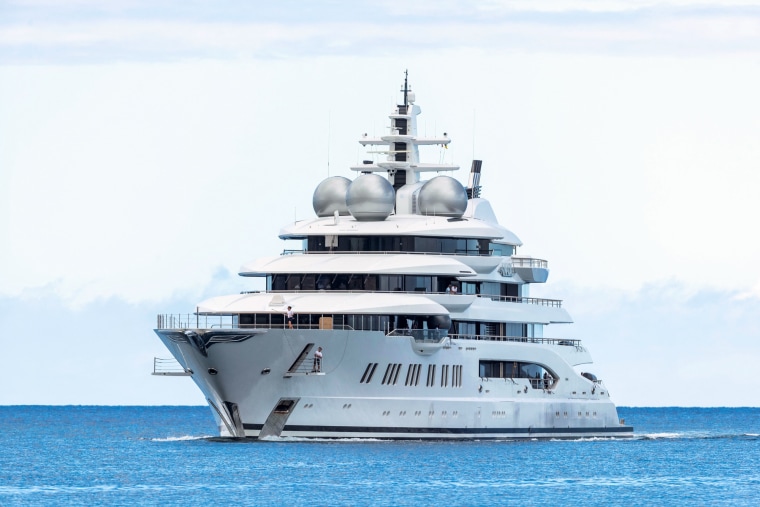
A mega-yacht seized by U.S. authorities from a Russian oligarch is costing the government nearly $1 million a month to maintain, according to new court filings.
The U.S. Department of Justice is seeking permission to sell a 348-foot yacht called Amadea, which it seized in 2022, alleging that it was owned by sanctioned Russian billionaire Suleiman Kerimov. The government said it wants to sell the $230 million yacht due to the “excessive costs” of maintenance and crew, which it said could total $922,000 a month.
“It is excessive for taxpayers to pay nearly a million dollars per month to maintain the Amadea when these expenses could be reduced to zero through [a] sale,” according to a court filing by U.S. prosecutors on Friday.
The monthly charges for Amadea, which is now docked in San Diego, California, include $600,000 per month in running costs: $360,000 for the crew; $75,000 for fuel; and $165,000 for maintenance, waste removal, food and other expenses. They also include $144,000 in monthly pro-rata insurance costs and special charges including dry-docking fees, at $178,000, bringing the total to $922,000, according to the filings.
The battle over Amadea and the costs to the government highlight the financial and legal challenges of seizing and selling assets owned by Russian oligarchs after the country’s invasion of Ukraine. European Commission President Ursula von der Leyen said last week that the European Union should use profits from more than $200 billion of frozen Russian assets to fund Ukraine’s war effort.
Her comments echoed government calls in the spring of 2022 to freeze the yachts, private jets and mansions of Russian billionaires in hopes of putting pressure on Russian President Vladimir Putin and raising money for the war effort.
Yet, nearly two years later, the legal process for proving ownership of the Russian assets and selling them has proven to be far more time-consuming and costly. In London, Russian billionaire Eugene Shvidler has waged a court battle over his private jets that were impounded, and Sergei Naumenko has been appealing the detention of his superyacht Phi.
The battle over Amadea began in April 2022, when it was seized in Fiji at the request of the U.S. government, according to the court filings.
Though the U.S. alleges that the yacht is owned by Kerimov, who made his fortune in mining, attorneys for Eduard Khudainatov, an ex-Rosneft CEO who has not been sanctioned, say he owns the yacht, and have sought to take back possession of the vessel.
In court filings, Khudainatov’s attorneys have objected to the U.S. government’s efforts to sell the yacht, saying a rushed sale could lead to a distressed sale price and that the maintenance costs are minor relative to the potential sale value.
Khudainatov’s attorneys refuse to pay the ongoing maintenance costs as long as the government pursues a sale and forfeiture. However, they say their client will reimburse the U.S. government for the more than $20 million already spent to maintain the yacht if it’s returned to its proper owner.
In court papers, the government says Kerimov disguised his ownership of Amadea through a series of shell companies and other owners. They say emails between crew members show Kerimov “was the beneficial owner of the yacht, irrespective of the titleholder of the vessel.”
The emails show that Kerimov and his family ordered several interior improvements of the yacht, including a new pizza oven and spa, and that between 2021 and 2022, when the boat was seized, “there were no guest trips on the Amadea that did not include either Kerimov or his family members,” according to the court filings.
The government also says Kerimov has been trying to sell Amadea for years, so a sale would be in keeping with his intent.
“This is not a situation in which a court would be ordering sale of a precious heirloom that a claimant desperately wishes to keep for sentimental reasons,” the government said in filings.
Even if Amadea were sold quickly, the proceeds wouldn’t automatically go to the government. Under law, the money would be held while Khudainatov and the government continue their battle in court over the ownership and forfeiture.
More from CNBC:
- Powell reinforces position that the Fed is not ready to start cutting interest rates
- Bill Gates-backed startup confident it can unearth more buried treasure after a historic copper find
- OpenAI shares Elon Musk emails urging startup to raise $1 billion, see Tesla as a cash cow
- Entertainment
- Sports Sports Betting Podcasts Better Planet Vault Mightier Autos Newsletters Unconventional Vantage Experts Voices
- Sports Betting
- Better Planet
- Newsletters
- Unconventional
Every Russian Oligarch Yacht Seized So Far—In Pictures
Before the invasion of Ukraine, the world was a playground for the Russian mega-rich.
Now, Russian oligarchs are struggling to hold on to their wealth, as their private jets and superyachts get seized and their properties impounded as a result of the heavy sanctions much of the world has imposed on the circle of billionaires around Vladimir Putin .
Since the European Union started imposing sanctions on an increasing number of Russian oligarchs, the list of luxury superyachts owned by Russian billionaires seized by authorities has steadily kept on growing.
Here's a breakdown.
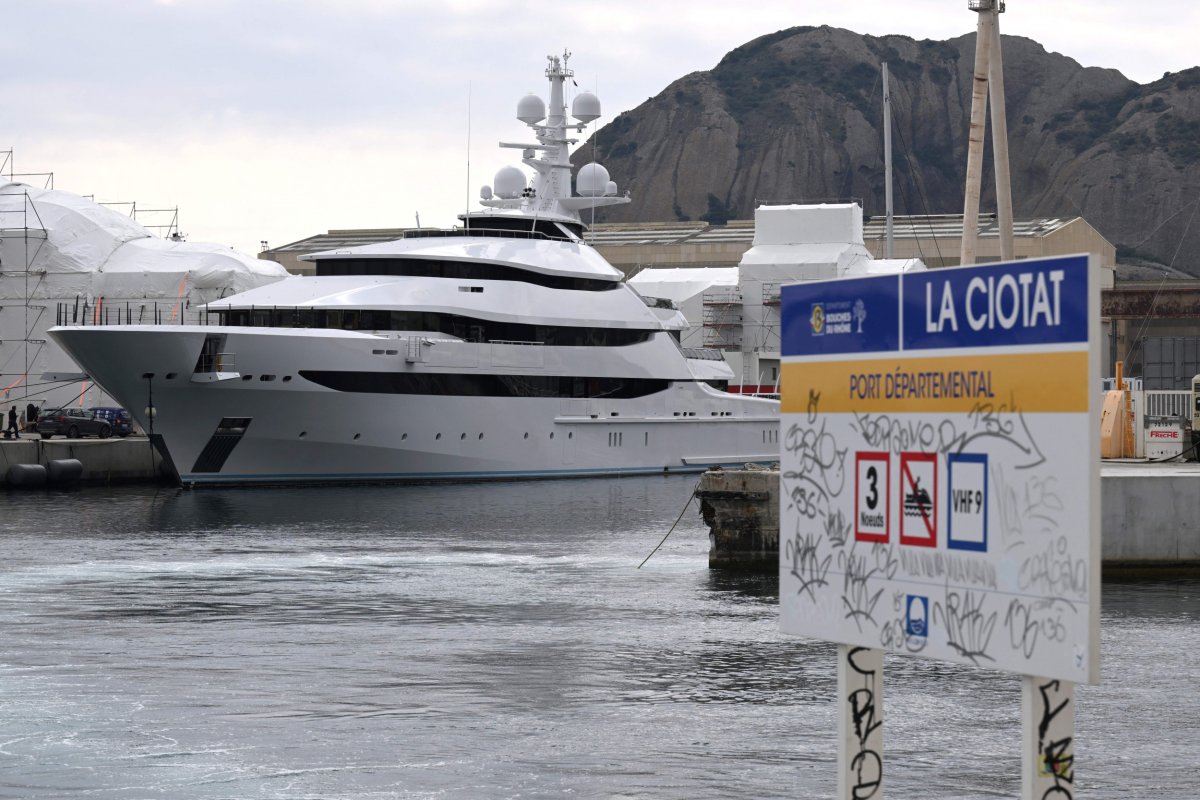
On March 2, French authorities seized a yacht they said belonged to Rosneft's boss Igor Sechin in the Mediterranean port of La Ciotat.
The owner of Amore Vero wasn't formally Sechin, but French authorities said they found him to be the main shareholder.
On the same day, news spread that German authorities had seized a luxury yacht owned by Russian billionaire Alisher Usmanov. But German officials denied that the Dilbar , a $600 million yacht named after the billionaire's mother, had been seized in Hamburg.
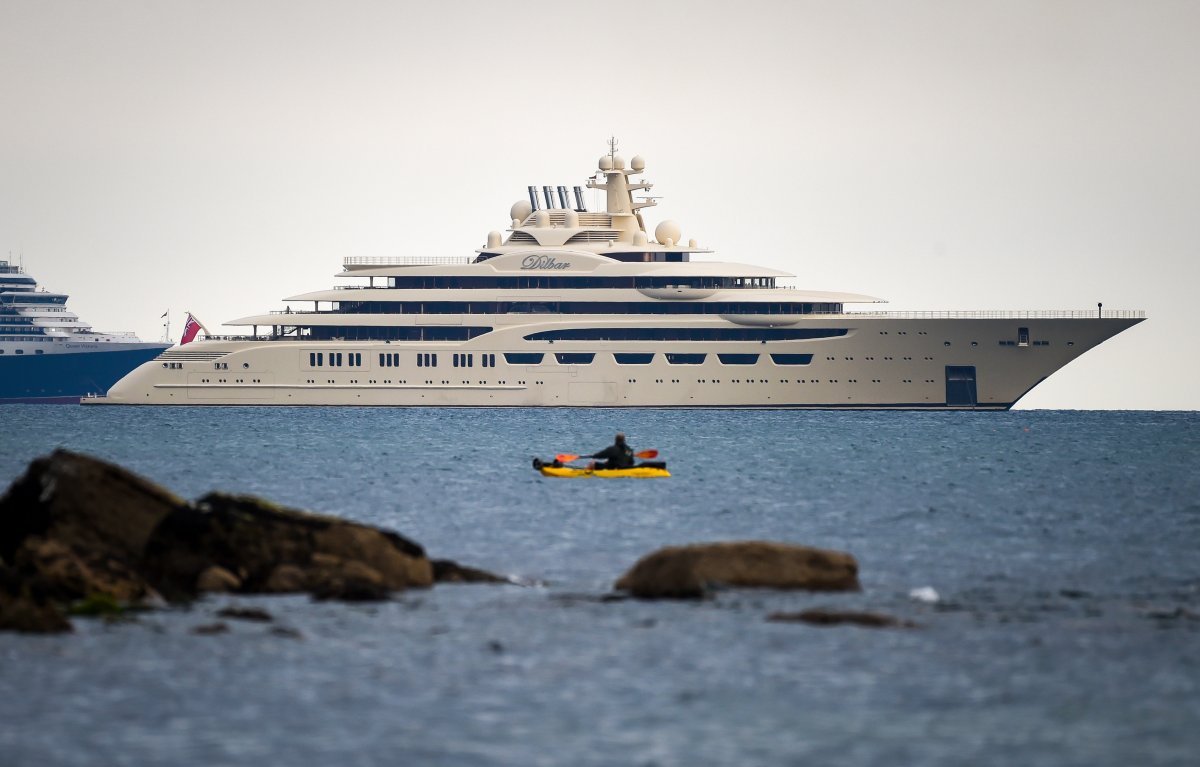
The yacht, over 490 feet long and boasting an 80-foot swimming pool, two helipads and a garden, is now simply blocked in the northern port and is not allowed to leave.
Usmanov is one of the richest men in Russia and the world, with an estimated worth of $14.2 billion. The European Union has frozen his assets and described him as "pro-Kremlin oligarch with particularly close ties to Russian President Vladimir Putin."
On March 14 in Barcelona, Spanish police seized a $140 million yacht belonging to Sergei Chemezov, a former KGB officer who now heads the state-owned defense conglomerate Rostec. Following the seizure, Spanish Prime Minister Pedro Sanchez promised "there will be more."
The Valerie , a 280-foot yacht, is technically registered to Chemezov's stepdaughter Anastasia Ignatova. She is under U.S. sanctions, as is Chemezov and his wife.
The next day, Spanish authorities seized Lady Anastasia , reportedly owned by Alexander Mikheyev, in Mallorca. Mikheyev, director of Russian arms exporter Rosoboronexport, is under EU sanctions.
A day later, Spain seized another yacht believed to belong to Sechin, the 440-foot-long Crescent , in the port of Tarragona in Catalonia.
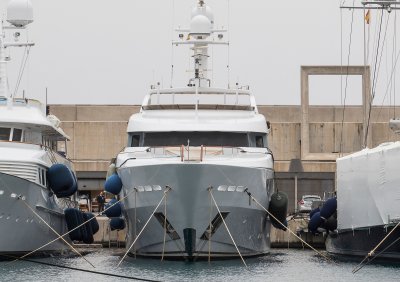
Since the beginning of March, Italy has seized three yachts belonging to Russian oligarchs.
Lady M , owned by steel magnate Alexey Mordashov, Russia's richest man, was seized in the port of Imperia on the same day as Lena , belonging to oil and gas mogul Gennady Timchenko, was seized in the port of Sanremo.
Lady M , formally registered in the Cayman Islands, has been docked in Imperia since January. The yacht is equipped with a beauty salon and a helicopter pad.
Lena , registered in the British Virgin Islands, has been in Sanremo since November 2021.
On March 12, Italian authorities seized Andrey Melnichenko's Sailing Yacht A , a $580 million yacht docked at the port of Trieste. Coal and fertilizer magnate Melnichenko was sanctioned by the EU on March 9.
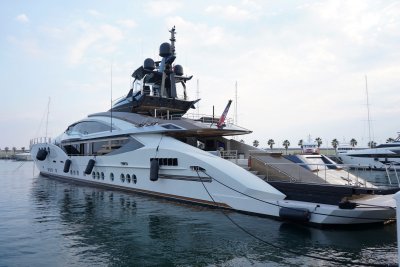
The Ragnar , another superyacht owned by Russian oligarch and former KGB agent Vladimir Strzhalkovsky, wasn't confiscated, but it's stuck in Norway because nobody will sell it fuel to leave.
According to Croatian media reports, Viktor Medvedchuk's 300-foot mega yacht, The Royal Romance, was seized in the bay of Rijeka on Wednesday. Medvedchuk is leader of Ukraine's main pro-Russia party.
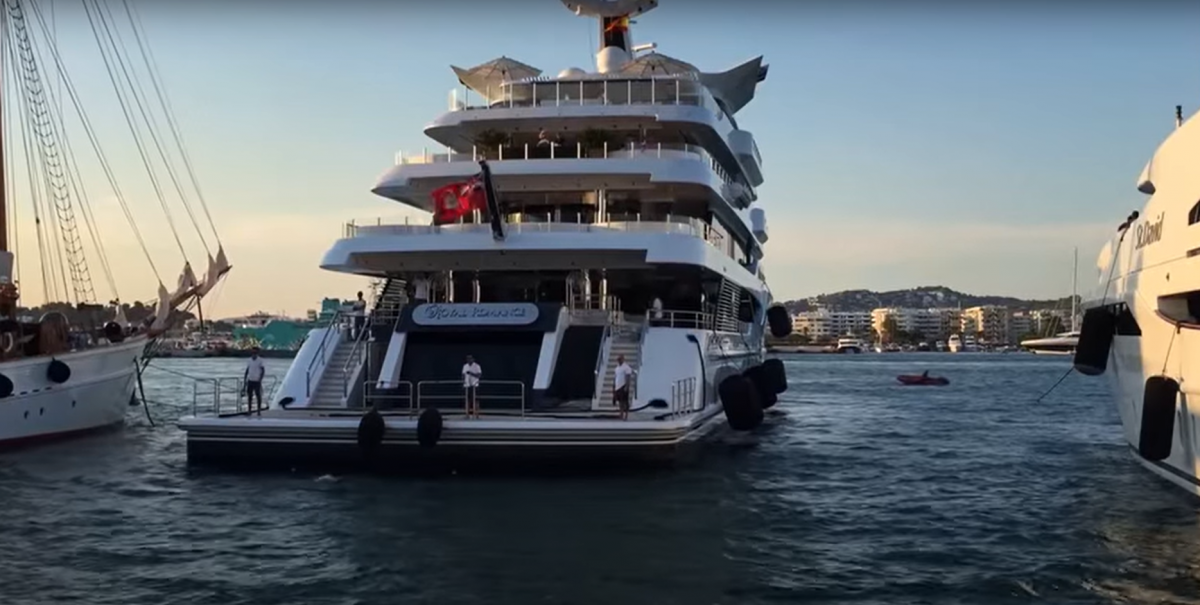
More yachts owned by Russian oligarchs and currently docked around Europe could yet be seized, as not all billionaires have been sanctioned by the EU and the ownership of some yachts is yet to be determined.
Those Russian oligarchs whose yachts haven't been seized are scrambling to take them far away from the grasp of European authorities, although they're running out of safe havens to hide their luxury vessels.
At least five Russian billionaires have moved their yachts to the Maldives as the EU imposed sanctions, ship-tracking data has shown. In early March, five superyachts were reportedly harbored in the Maldives, which doesn't have an extradition treaty with the U.S.
Uncommon Knowledge
Newsweek is committed to challenging conventional wisdom and finding connections in the search for common ground.
About the writer
Giulia Carbonaro is a Newsweek Reporter based in London, U.K. Her focus is on U.S. and European politics, global affairs and housing. She has covered the ups and downs of the U.S. housing market extensively, as well as given in-depth insights into the unfolding war in Ukraine. Giulia joined Newsweek in 2022 from CGTN Europe and had previously worked at the European Central Bank. She is a graduate of Nottingham Trent University. Languages: English, Italian, French.
You can get in touch with Giulia by emailing [email protected].
To read how Newsweek uses AI as a newsroom tool, Click here.

- Newsweek magazine delivered to your door
- Newsweek Voices: Diverse audio opinions
- Enjoy ad-free browsing on Newsweek.com
- Comment on articles
- Newsweek app updates on-the-go

Top stories

MAGA Faces Tough Test in Ohio

Israel Establishes New Mountain Unit to Fight on Lebanon, Syria Borders

Amy Coney Barrett Warns Greg Abbott's Border Fight Isn't Over

Prince William References Kate Middleton After Video Controversy

The $578 million megayacht owned by Russian oligarch Andrey Melnichenko was seized by Italy
- Russian oligarch Andrey Melnichenko's yacht was seized Friday, Italian authorities said.
- Sailing Yacht A is the world's largest sailing yacht at around 469 feet long and has eight decks.
- Melnichenko was sanctioned by the European Union in response to Russia's invasion of Ukraine.

A megayacht belonging to Russian oligarch Andrey Melnichenko was seized by Italian authorities on Friday, CNN reported.
A statement from Italy's finance police said the yacht, known as SY A or Sailing Yacht A, was worth around 530 million euros, or $578 million, according to CNN. It also said the yacht was currently in storage in Trieste, Italy. Maritime tracking data viewed by Insider confirmed the location of the yacht in the Adriatic Sea.
Melnichenko is one of the billionaire oligarchs sanctioned by the European Union in response to Russia's invasion of Ukraine. Melnichenko, who is worth $11 billion according to Forbes, founded fertilizer producer EuroChem Group and coal energy company SUEK.
Related stories
In announcing its decision, the EU council said Melnichenko "belongs to the most influential circle of Russian businesspeople with close connections to the Russian Government." It also said he was among a group of 37 businesspeople who met with Russian President Vladimir Putin and other officials on February 24 to discuss the impact of potential sanctions.
"The fact that he was invited to attend this meeting shows that he is a member of the closest circle of Vladimir Putin and that he is supporting or implementing actions or policies which undermine or threaten the territorial integrity, sovereignty and independence of Ukraine, as well as stability and security in Ukraine," the EU said, adding it also showed he is "providing a substantial source of revenue to the Government of Russia."
In a statement provided to Insider, a spokesperson for Melnichenko denied the EU's accusations about his connections to the war in Ukraine.
"Andrey Melnichenko is an international self-made entrepreneur. He has no relation to the tragic events in Ukraine. He has no political affiliations. To draw a parallel between attending a meeting through membership in a business council, just as dozens of businesspeople from both Russia and Europe have done in the past, and undermining or threatening a country is absurd and nonsensical," the statement said.
"There is no justification whatsoever for placing him on the EU sanctions list. We will be disputing these baseless and unjustified sanctions, and believe that the rule of law and common sense will prevail," the statement continued.
The spokesperson also noted Melnichenko resigned as a member of the board and main beneficiary of both EuroChem Group and SUEK this week, as the companies announced in separate statements on Thursday. He also said both companies are privately owned and not affiliated with any government, and that EuroChem Group is based in Switzerland.
Sailing Yacht A is the worlds largest sailing yacht at around 469 feet long, according to SuperYachtFan.com . It has 300-foot masts, eight decks, a swimming pool, and an underwater observation pod. It's one of several megayachts owned by Russian oligarchs that are subject to sanctions.
Some Russian oligarchs and billionaires have tried to escape sanctions by transporting their luxury yachts to places like Dubai, which has not enacted sanctions, and the Maldives, which does not have an extradition treaty with the US.
- Main content
Accessibility links
- Skip to main content
- Skip to main Navigation
- Skip to Search

Sanctioned Russian Oligarch’s Megayacht Hides in a UAE Creek
- By Associated Press
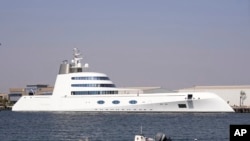
In the dusty, northern-most sheikhdom of the United Arab Emirates, where laborers cycle by rustic tea shops, one of the world’s largest yachts sits in a quiet port — so far avoiding the fate of other luxury vessels linked to sanctioned Russian oligarchs.
The display of lavish wealth is startling in one of the UAE’s poorest emirates, a 90-minute drive from the illuminated high-rises of Dubai. But the 118-meter (387-foot) Motor Yacht A ’s presence in a Ras al-Khaimah creek also shows the UAE’s neutrality during Russia’s war on Ukraine as the Gulf country remains a magnet for Russian money and its oil-rich capital sees Moscow as a crucial OPEC partner .
Since Russian tanks rolled into Ukraine, the seven sheikhdoms of the Emirates have offered a refuge for Russians, both those despairing of their country’s future as well as the mega-wealthy concerned about Western sanctions .
While much of the world has piled sanctions on Russian institutions and allies of President Vladimir Putin, the Emirates has not. It also avoids overt criticism of the war, which government readouts still refer to as the “Ukraine crisis.”
The Motor Yacht A belongs to Andrey Melnichenko, an oligarch worth some $23.5 billion, according to Forbes. He once ran the fertilizer producer Eurochem and SUEK, one the the world’s largest coal companies.
The European Union in March included Melnichenko in a mass list of sanctions on business leaders and others described as close to Putin. The EU sanctions noted he attended a Feb. 24 meeting Putin held the day of the invasion.
“The fact that he was invited to attend this meeting shows that he is a member of the closest circle of Vladimir Putin and that he is supporting or implementing actions or policies which undermine or threaten the territorial integrity, sovereignty and independence of Ukraine, as well as stability and security in Ukraine,” the EU said at the time.
Melnichenko resigned from the corporate positions he held in the two major firms, according to statements from the companies. However, he has criticized Western sanctions and denied being close to Putin.
Melnichenko could not be reached for comment through his advisers.
Already, authorities in Italy have seized one of his ships — the $600 million Sailing Yacht A . France, Spain and Britain as well have sought to target superyachts tied to Russian oligarchs as part of a wider global effort to put pressure on Putin and those close to him.
But the $300 million Motor Yacht A so far appears untouched. It flew an Emirati flag on Tuesday when Associated Press journalists observed the ship. Two crew members milled around the deck.
The boat’s last recorded position on March 10 put it off the Maldives in the Indian Ocean, just over 3,000 kilometers (1,860 miles) from Ras al-Khaimah. Satellite images from Planet Labs PBC analyzed by the AP show the vessel in Ras al-Khaimah’s creek beginning March 17, a week later.
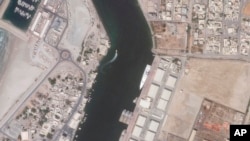
The Financial Times first reported on the ship’s presence in the UAE .
Authorities in Ras al-Khaimah did not respond to a request for comment on the yacht’s presence. The UAE’s Foreign Ministry did not answer questions about the ship, but said in a statement to the AP that it takes “its role in protecting the integrity of the global financial system extremely seriously.”
But so far, the UAE has taken no such public action targeting Russia. The country abstained on a U.N. Security Council vote in February condemning Russia’s invasion , angering Washington.
The neutral response may stem from “the financial gain we’re seeing in Dubai in terms of new tourist arrivals, and Russian efforts to move assets and buy property,” said Karen Young, a senior fellow at the Washington-based Middle East Institute.
The flow of Russian money — both legitimate and shady — is now an open secret in Dubai, where lavish hotels and beaches increasingly bustle with Russian speakers. State-run radio hosts cheerily describe a massive influx.
The UAE became one of the few remaining flight corridors out of Moscow. The Emirati government offered three-month multiple-entry visas upon arrival to all Russians, allowing major companies to easily transfer their employees from Moscow to Dubai. The private jet terminal at Al Maktoum International at Dubai World Central has seen a 400% spike in traffic, the airport’s CEO recently told the AP .
Real estate agents have reported a surge of interest from Russians seeking to buy property in Dubai , particularly in the skyscrapers of Dubai Marina and villas on the Palm Jumeirah.
For those who want to move to the UAE, buying high-end property also helps secure a visa.
“Business is booming right now,” said Thiago Caldas, CEO of the Dubai-based property firm Modern Living, which now accepts cryptocurrency to facilitate sales with new Russian clients. “They have a normal life and don’t face restrictions.”
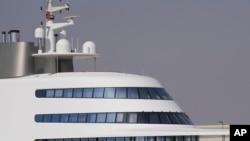
Caldas said inquiries from Russian clients in Dubai have multiplied by over 10 since the war, forcing his firm to hire three Russian-speaking agents to deal with the deluge.
With sanctions on Russian banks and businesses thwarting many citizens’ access to foreign capital, Russians are increasingly trying to bypass bank transfers through digital currencies in Dubai, said two cryptocurrency traders in the city, where they’re able to liquidate large sums of cash.
“It’s a safe haven. … The inflow from Russian accounts skyrocketed 300% days after the war in Ukraine began,” said a Russian crypto trader in Dubai, who spoke like the other on condition of anonymity for fear of reprisals.
Meanwhile, Abu Dhabi’s Mubadala state investment company remains among the most active sovereign wealth funds in Russia, along with those of China and Qatar, according to calculations by Javier Capapé of IE University in Spain for the AP.
But pressure is growing. Late on Tuesday, the U.S. Embassy in Abu Dhabi posted a strongly worded video message in solidarity with Ukraine featuring local ambassadors from the world’s leading democracies as Russia’s foreign minister visits the region.
“We are united against Russia’s unjustifiable, unprovoked and illegal aggression,” said Ernst Peter Fischer, Germany’s ambassador to the UAE.

Fiji Pauses US Seizure of Russia-Linked Superyacht Amadea

At US Urging, Fiji Seizes Russian Oligarch’s Yacht

US Seeks Authority to Give Seized Russian Assets to Ukraine

US Supports Transferring Some Seized Russian Assets to Ukraine
More middle east news.

UN Rights Chief Warns Israel's Restriction of Aid Could Be War Crime

New Study Reports Widespread Forced Labor Abuses
Qatar ‘cautiously optimistic’ israel-hamas cease-fire can be reached, us destroys houthi missiles, drones in new yemen strike, iranians tighten belts for persian new year festivities.

Israel & Palestine: Weighing the Solutions
The day in photos.

Marcy 19, 2024
Watch CBS News
Court in Fiji approves U.S. warrant to seize Russian-owned mega-yacht
By Graham Kates
May 3, 2022 / 9:32 AM EDT / CBS News
Fiji's High Court on Tuesday ruled that a massive Russian-owned yacht can be seized by U.S. authorities.
American and Fijian officials claim the Cayman Islands-flagged Amadea is the property of Suleiman Kerimov, an oligarch who built his fortune on gold mining. Kerimov was sanctioned in March by the United States, United Kingdom and European Union in response to the Russian invasion of Ukraine .
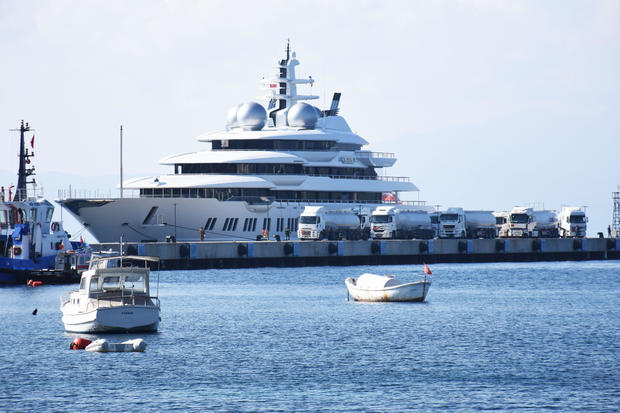
But an attorney who represents Millemarin Investments, the company the $325 million ship is registered to, said it's not owned by Kerimov. Instead, he argued in court that corporate paperwork traces the ship's ownership to Eduard Khudainatov, a former executive at Russia's state-owned Rosneft oil company who has not been sanctioned.
Kerimov and Khudainatov could not be reached for comment. The company intends to appeal Tuesday's decision.
The Amadea berthed in Fiji on April 13, according to local reports and the maritime analytics website Marine Traffic. Soon after, a federal judge approved a warrant for the ship to be seized and on April 19, Fiji's top prosecutor moved to prevent the ship from leaving.
- Russian oligarchs moving yachts as U.S. tracks down assets
The Department of Justice could not immediately be reached for comment.
On April 4, the agency announced that Spanish authorities had assisted it in seizing another Russian yacht, the $90 million Tango, which was owned by Viktor Vekselberg, the owner of the Russian conglomerate Renova Group.
Legislation passed by the House of Representatives on April 27 would allow the U.S. to sell the yacht and other properties worth more than $2 million seized from Russian oligarchs in order to fund the Ukrainian war effort. President Joe Biden supports the bill, which has yet to pass the Senate.
"We're going to seize their yachts, their luxury homes and other ill-begotten gains," Biden said on April 28 at the White House.
Graham Kates is an investigative reporter covering criminal justice, privacy issues and information security for CBS News Digital. Contact Graham at [email protected] or [email protected]
More from CBS News

Russian woman kidnapped near U.S. border in Mexico is freed

Ex-deputy gets 20 years in racist torture of Black men

Unilever to ditch Ben & Jerry's as it exits the ice cream business

Blinken says Gaza's entire population facing "acute food insecurity"
Money Report

Russian oligarch's yacht is costing US taxpayers close to $1 million a month
By robert frank,cnbc • published march 6, 2024 • updated on march 6, 2024 at 11:26 pm.
A mega-yacht seized by U.S. authorities from a Russian oligarch is costing the government nearly $1 million a month to maintain, according to new court filings.
- The Justice Department is seeking permission to sell Amadea, which it seized in 2022, alleging that it was owned by sanctioned Russian billionaire Suleiman Kerimov.
- Attorneys for Eduard Khudainatov, an ex-Rosneft CEO who has not been sanctioned, say he owns the yacht, and have sought to take back possession of the vessel.
The U.S. Department of Justice is seeking permission to sell a 348-foot yacht called Amadea, which it seized in 2022, alleging that it was owned by sanctioned Russian billionaire Suleiman Kerimov. The government said it wants to sell the $230 million yacht due to the "excessive costs" of maintenance and crew, which it said could total $922,000 a month.
Get Tri-state area news and weather forecasts to your inbox. Sign up for NBC New York newsletters.
"It is excessive for taxpayers to pay nearly a million dollars per month to maintain the Amadea when these expenses could be reduced to zero through [a] sale," according to a court filing by U.S. prosecutors on Friday.
The monthly charges for Amadea, which is now docked in San Diego, California, include $600,000 per month in running costs: $360,000 for the crew; $75,000 for fuel; and $165,000 for maintenance, waste removal, food and other expenses. They also include $144,000 in monthly pro-rata insurance costs and special charges including dry-docking fees, at $178,000, bringing the total to $922,000, according to the filings.
Sign up to receive future editions of CNBC's Inside Wealth newsletter with Robert Frank.
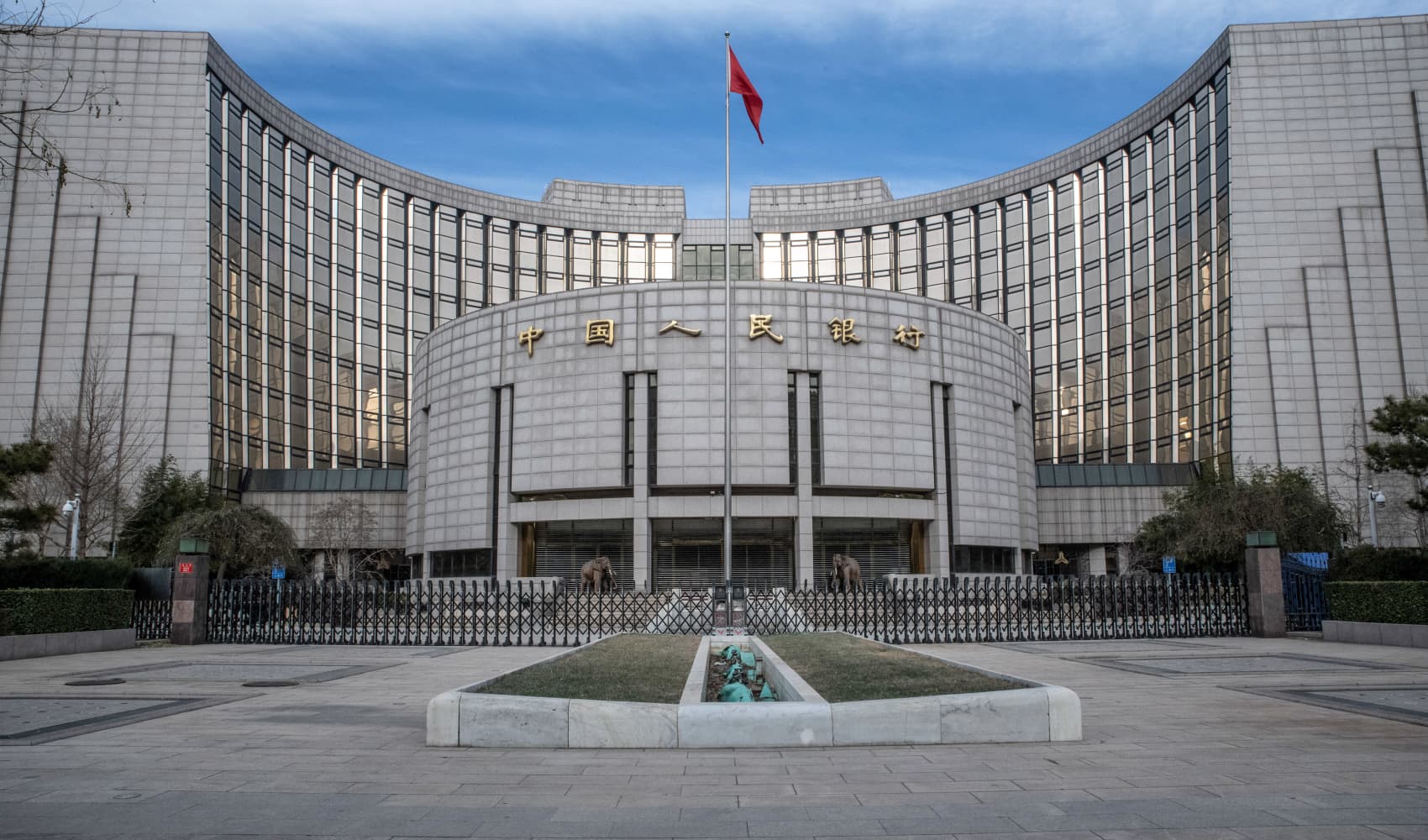
Asia markets poised to rise ahead of Federal Reserve's rate decision; China loan prime rate data on tap

Jim Cramer names some non-tech Nvidia partners to watch
The battle over Amadea and the costs to the government highlight the financial and legal challenges of seizing and selling assets owned by Russian oligarchs after the country's invasion of Ukraine. European Commission President Ursula von der Leyen said last week that the European Union should use profits from more than $200 billion of frozen Russian assets to fund Ukraine's war effort.
Her comments echoed government calls in the spring of 2022 to freeze the yachts, private jets and mansions of Russian billionaires in hopes of putting pressure on Russian President Vladimir Putin and raising money for the war effort.
Yet, nearly two years later, the legal process for proving ownership of the Russian assets and selling them has proven to be far more time-consuming and costly. In London, Russian billionaire Eugene Shvidler has waged a court battle over his private jets that were impounded, and Sergei Naumenko has been appealing the detention of his superyacht Phi.
The battle over Amadea began in April 2022, when it was seized in Fiji at the request of the U.S. government, according to the court filings.
Though the U.S. alleges that the yacht is owned by Kerimov, who made his fortune in mining, attorneys for Eduard Khudainatov, an ex-Rosneft CEO who has not been sanctioned, say he owns the yacht, and have sought to take back possession of the vessel.
In court filings, Khudainatov's attorneys have objected to the U.S. government's efforts to sell the yacht, saying a rushed sale could lead to a distressed sale price and that the maintenance costs are minor relative to the potential sale value.
Khudainatov's attorneys refuse to pay the ongoing maintenance costs as long as the government pursues a sale and forfeiture. However, they say their client will reimburse the U.S. government for the more than $20 million already spent to maintain the yacht if it's returned to its proper owner.
In court papers, the government says Kerimov disguised his ownership of Amadea through a series of shell companies and other owners. They say emails between crew members show Kerimov "was the beneficial owner of the yacht, irrespective of the titleholder of the vessel."
The emails show that Kerimov and his family ordered several interior improvements of the yacht, including a new pizza oven and spa, and that between 2021 and 2022, when the boat was seized, "there were no guest trips on the Amadea that did not include either Kerimov or his family members," according to the court filings.
The government also says Kerimov has been trying to sell Amadea for years, so a sale would be in keeping with his intent.
"This is not a situation in which a court would be ordering sale of a precious heirloom that a claimant desperately wishes to keep for sentimental reasons," the government said in filings.
Even if Amadea were sold quickly, the proceeds wouldn't automatically go to the government. Under law, the money would be held while Khudainatov and the government continue their battle in court over the ownership and forfeiture. Don't miss these stories from CNBC PRO:
- Instead of chasing Nvidia, investor buys these misunderstood, cheap growth stocks for big returns
- Why Warren Buffett thinks the power of compound interest is the key to his success
- Forget cash — it's time to move into fixed income, Franklin Templeton strategist says
- Dan Niles reveals why he prefers the 'Fantastic Four' and when the 'AI bubble' might pop
- Investors should tread carefully in March after bitcoin's explosive rally to $60,000
Also on CNBC
- Here's how self-made millionaire Vivian Tu created wealth
- Here are the most powerful passports for 2024 — Switzerland tops the list
- Many women are looking for 'financial peace,' expert says. How they can achieve it


This article tagged under:
The Hunt for Russian Oligarchs’ Mega-Yachts Is On
Get the latest from vice news in your inbox. sign up right here..
By signing up, you agree to the Terms of Use and Privacy Policy & to receive electronic communications from Vice Media Group, which may include marketing promotions, advertisements and sponsored content.
Who's Paying for Russian Oligarch's Seized Yacht in San Diego Bay?
The amadea, which superyachttimes.com called the 63rd largest yacht in the world, tied up monday at naval base san diego, in national city, by eric s. page and mari payton • published june 28, 2022 • updated on june 28, 2022 at 2:11 pm.
Many San Diegans who saw the news about the Amadea — the $325 million seized Russian oligarch's yacht that docked in San Diego on Monday — may be wondering: Who's paying for that?
Imagine how much the fuel costs to sail it more than 5,000 miles from Fiji, where it was seized earlier this month, to San Diego? A local marine fuel dock quoted the following prices, if you're wondering: $7.40 for gas, $7.35 for diesel. According to SuperYachtTimes.com, the Amadea has a 392,000-liter fuel tank. That works out to about 103,555 gallons, so it could cost $766,307 or so just to fill up.
And then there are maintence costs on a 350-foot long yacht, which, you can be sure, are extensive and necessary — in fact, not undertaking such efforts can cause the vessel's value to decline if it deteriotes due to neglect.
Get San Diego local news, weather forecasts, sports and lifestyle stories to your inbox. Sign up for NBC San Diego newsletters.
The Amadea carries a full complement of 36 crew, including the captain, according to SuperYachtTimes, but it won't need nearly that many once she tied up at Naval Base San Diego in National City. Nevertheless, someone will be monitoring the yacht and conducting the maintenance.
According to the U.S. Department of Justice, the yacht was bought with what it calls "dirty money," and, as such, some may be relieved to hear, will be sold to the highest bidder. Presumably, the associated post-seizure costs accrued after its seizure will be coming off the top of the sale price. Until then, the Amadea, which SuperYachtTimes called the 63rd larges yacht in the world, will resume in the custody of the U.S.

San Diego single-family homes prices soar nearly 6% in just a month
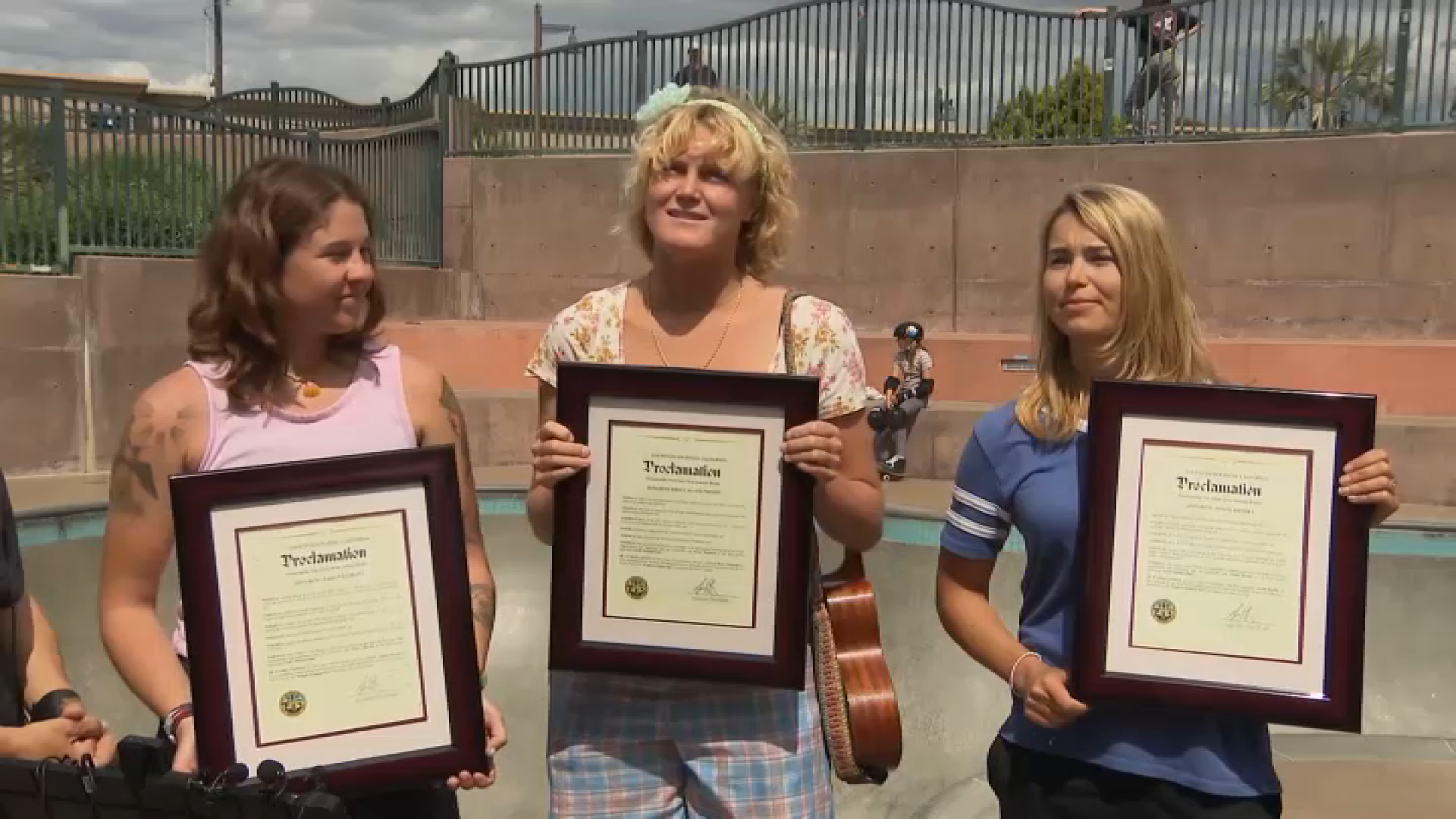
Skateboarders kickflipping their way into male-dominated sport honored for Women's History Month
Officials with the DOJ said the Amadea, which was seized in connection to the department's KleptoCapture campaign undertaken in the wake of the invasion of Ukraine by Russia, was owned by Suleiman Kerimov a Russian billionaire.
After the yacht arrived in San Diego, John Kirby, a former federal prosecutor, told NBC 7 that he thinks the U.S. government hopes moves like the Amadea's seizure are efforts to apply pressure to Russian president Vladimir Putin.
Earlier this month, Deputy U.S. Attorney General Lisa O. Monaco said, regarding the Amadea, “The department had its eyes on every yacht purchased with dirty money. This yacht seizure should tell every corrupt Russian oligarch that they cannot hide — not even in the remotest part of the world. We will use every means of enforcing the sanctions imposed in response to Russia’s unprovoked and unjustified war in Ukraine.”
The court ruling represented a significant victory for the U.S. as it encounters obstacles in its attempts to seize the assets of Russian oligarchs around the world. While those efforts are welcomed by many who oppose the war in Ukraine, some actions have tested the limits of American jurisdiction abroad.
The United States wasted no time in taking command of the after a Fiji court ruled in its favor and sailed the ship away from the South Pacific nation just hours after the ruling.
"If you could say or somehow prove that this boat … that the oligarch had the money for this boat because he bribed Vladimir Putin, that is public corruption," Kirby said. "It’s a crime even when it takes place outside the United States. The United States can still act upon it."
According the website, the Amadea is not currently for sale, but that may soon change. Until then, you can "shop" for other eye-popping, wallet-busting boats here .
The Associated Press contributed to this report — Ed.
This article tagged under:
Why the U.S. put a $1 million bounty on a Russian yacht’s alleged manager
On Sept. 3, 2020, the staff of a $90 million yacht placed an order with a U.S. company for a set of luxury bathrobes that came to $2,624.35.
For roughly two years before that, according to federal prosecutors, the yacht’s management had been falsely claiming it was working for a boat named “Fanta.” But the luxury bathrobes came embroidered with a monogram that, prosecutors said, revealed the yacht’s true identity: “Tango.”
That was a problem, officials say in court papers, because Tango was owned by a Russian billionaire under U.S. sanctions, and doing business on his behalf violated federal law.
Late last month, U.S. authorities unveiled a $1 million reward for information leading to the arrest and or conviction of the man they say was running the yacht staff and orchestrated the deception with the robes — Vladislav Osipov, 52, a Swiss-based businessman from Russia. In a new indictment , federal prosecutors say Osipov misled U.S. banks and companies into doing business with the Tango yacht despite the sanctions on the Russian owner, whom the Justice Department has identified as billionaire Viktor Vekselberg .
Osipov has denied the allegations. Osipov’s attorney has said that the government has failed to demonstrate that Vekselberg owned the yacht, and that its management was therefore not a sanctions violation.
The reward offer for Osipov reflects the latest stage in the evolution of the West’s broader financial war against Russia two years into the war in Ukraine, as the United States and its allies increasingly target intermediaries accused of enabling Russian oligarchs to circumvent sanctions.
Many Russians close to President Vladimir Putin have been under sanctions dating to 2014, when Russia seized Crimea from Ukraine and sent proxy forces into that country’s eastern Donbas region. When Russia invaded Ukraine in 2022, President Biden vowed to deal a “crushing blow” with a barrage of new sanctions on financial institutions, industries, business executives and others tied to the Kremlin. But roughly two years later, Russia’s economy has proved surprisingly resilient after the nation poured tens of billions of dollars into ramping up its military industry. Moscow has also worked around the sanctions, finding new third parties to supply it with critical military and industrial hardware, as well as countries beyond Europe to buy its oil.
Now, the West is trying to increase the reach of its sanctions by digging deeper into Russian supply chains. Late last month, the Treasury Department announced more than 500 new sanctions targeting Russia , primarily on military and industrial suppliers. The Justice Department also announced charges against two U.S.-based “facilitators” of a Russian state banker who is under sanction, as well as the guilty plea of a dual national based in Atlanta who was accused of laundering $150 million through bank accounts and shell companies on behalf of Russian clients.
Prioritizing criminal charges against — and the arrests of — Western employees of Russia’s elites represents a new escalation of the U.S. financial war against Putin, experts say. One Moscow businessman, speaking on the condition of anonymity for fear of retribution, said many influential Russians are concerned about the arrest of two associates of Andrey Kostin, the head of VTB, Russia’s second-biggest state bank. These associates, Vadim Wolfson and Gannon Bond, were charged with helping Kostin evade sanctions by maintaining a $12 million property in Aspen, Colo., for Kostin’s benefit while concealing his ownership. Kostin has said that the charges of sanctions evasion against him are “unfounded” and that he has not violated any laws . Bond has pleaded not guilty; Wolfson hasn’t made an initial court appearance yet.
Wolfson, also known as Vadim Belyaev, had been a Russian billionaire until the Russian government took over his bank in 2017. Bond, 49, is a U.S. citizen from Edgewater, N.J. For all Russians living abroad and working with people in Russia, the threat of criminal charges is a much more worrying prospect than the sanctions imposed by the Treasury Department last month against hundreds of individuals and entities, the businessman said, in part because sanctions are far easier to dodge than criminal charges.
“What you have seen through today’s public announcements are our efforts at really targeting the facilitators who possess the requisite skill set, access, connections that allow the Russian war machine [and] the Russian elites to continually have access to Western services and Western goods,” David Lim, co-director of the Justice Department’s KleptoCapture task force, which is tasked with enforcing U.S. sanctions over Russia’s invasion of Ukraine, told reporters last month.
Thad McBride, an international trade partner at the law firm Bass Berry & Sims, said the crackdown on intermediaries reflected the natural evolution of the U.S. sanctions campaign in response to Russian adjustments.
“It seems to me they have gone through a comprehensive list of the oligarchs, and you can debate whether or not it’s had a meaningful impact on the Russian war effort,” McBride said. “Because they’re getting smarter about who’s who, they’re finding other people who play meaningful roles in these transactions, even though they’re not showing up in the headlines.”
The charges against Osipov related to his alleged management of the Tango yacht illustrate the mounting potential consequences for people in Europe and the United States who attempt to do business with Russians targeted by Western allies, as well as the opaque structures allegedly employed by those seeking to evade sanctions.
With a net worth estimated by Forbes in 2021 at $9 billion, Vekselberg, 66, has long drawn scrutiny from the West — and sought to safeguard his wealth. He made his initial fortune in aluminum and oil in Russia’s privatization of the 1990s and then expanded into industrial and financial assets in Europe, the United States and Africa, with Putin’s blessing. In addition to the yacht, federal prosecutors say, Vekselberg acquired $75 million worth of properties, including apartments on New York’s Park Avenue and an estate in the Long Island town of Southampton.
Vekselberg, who declined to comment for this article, has not been criminally charged by the Justice Department. In a 2019 interview with the Financial Times, he denounced the sanctions as arbitrary and harmful for international business, saying he had been targeted just because he was Russian and rich and knows Putin.
In April 2018, the Treasury Department under the Trump administration sanctioned Vekselberg and six other Russian oligarchs as part of broader financial penalties over the Kremlin’s invasion of Crimea, support for President Bashar al-Assad in Syria and interference in the 2016 U.S. presidential election. Vekselberg was also targeted for his work for the Kremlin as chairman of the Skolkovo Foundation, an attempt to create Russia’s version of the Silicon Valley — evidence that appeared to undermine the Russian businessman’s claims that he operated independently of the Kremlin.
But with Vekselberg’s payments monitored by U.S. banks, according to the federal indictment , Osipov used shell companies and intermediaries to avert the bite of sanctions. Vekselberg kept other major assets out of the reach of U.S. authorities by making use of the Treasury Department’s 50 percent ownership rule, which stipulates that it is illegal to transact with firms only if an owner under sanction controls more than 50 percent of the business.
For example, a month after Treasury imposed sanctions on Vekselberg in April 2018, his Renova Innovation Technologies sold its 48.5 percent stake in Swiss engineering giant Sulzer to Tiwel Holding AG, a group that is nevertheless still “beneficially owned” — meaning, owned in practice — by Vekselberg through Columbus Trust, a Cayman Islands trust, according to Sulzer’s corporate filing. Vekselberg’s longtime right-hand man at Renova, Alexei Moskov, replaced one of Vekselberg’s direct representatives on the board. Moskov told The Washington Post that he stepped down from all his executive positions at Renova Group in 2018 after U.S. sanctions were first imposed and from that moment ceased to be Vekselberg’s employee.
The attempts to circumvent the sanctions appear to have found some success in the U.S. legal system. Columbus Nova, a U.S.-based asset management fund controlling more than $100 million in assets in the U.S. financial and tech industry, is run by Vekselberg’s cousin, Andrew Intrater. The firm battled for more than two years to lift a freeze on Columbus Nova’s assets, imposed by Treasury’s Office of Foreign Assets Control because of the sanctions on Vekselberg, and won, reaching a settlement agreement with the Treasury Department. After renaming itself Sparrow Capital LLC, Columbus Nova successfully argued that Intrater — not Vekselberg — owns the fund. Intrater argued that the company was 100 percent owned by U.S. citizens and that no individual or entity under sanction held any interest in it. Intrater said Columbus Nova had earned fees for managing investment funds owned by Renova. He said he had repeatedly told Treasury he would not distribute any funds to Vekselberg.
Now Osipov, the alleged manager of Vekselberg’s $90 million yacht, is attempting a similar argument as U.S. authorities seek his arrest on charges of bank fraud, money laundering, conspiracy to defraud the United States, and violations of sanctions law.
The federal indictment states that the Tango was owned by a shell corporation registered in the British Virgin Islands that was in turn owned by several other companies. The Virgin Islands shell company, authorities say, was controlled by Osipov, who also served in senior roles for multiple companies controlled by Vekselberg. U.S. officials also say Vekselberg ultimately controlled the other companies that owned the Virgin Islands shell company.
According to the indictment, a Tango official instructed a boat management company in Palma de Mallorca, Spain, to use a false name for the yacht — “Fanta” — to disguise its true identity from U.S. financial institutions and firms, which try to avoid doing business with an entity or person under sanction.
Working at Osipov’s direction, according to the indictment, employees for Tango bought more than $8,000 worth of goods for the yacht that were unwittingly but illegally processed by U.S. firms and U.S. financial institutions, including navigation software, leather basket magazine holders provided by a bespoke silversmith, and web and computing services. The management company running Tango, run by Osipov, also paid invoices worth more than $180,000 to a U.S. internet service provider, federal prosecutors say.
The Tango was seized by the FBI and Spanish authorities in the Mediterranean not long after Russia invaded Ukraine in 2022, and Osipov was first indicted last year. The owner of the Spanish yacht management company hired by Osipov, Richard Masters, 52, of Britain, was criminally charged last year by federal prosecutors with conspiracy to defraud the United States and violating federal sanctions law. A request for comment sent to Masters’ firm was not returned.
But in recent court documents, Osipov’s attorney argues that the yacht was not more than 50 percent owned by Vekselberg, and that the government hasn’t demonstrated it was. Barry J. Pollack, an attorney at Harris, St. Laurent and Wechsler, also says the government never warned Osipov of its novel and “unconstitutional” application of federal sanctions law.
“The government points to no precedent that supports its extraordinary interpretation and cites no authority that allows the traditional rules of statutory construction to be turned on their head,” Pollack wrote in a defense filing. The filing adds: “[Osipov] is not a fugitive because he did not engage in any of the allegedly criminal conduct while in the United States, has never resided in the United States, did not flee from the United States, and has not concealed himself.”
Still, the State Department’s Transnational Organized Crime Rewards Program has said it will provide up to $1 million for information leading to Osipov’s arrest, warning that he may visit Herrliberg, Switzerland; Majorca, Spain; or Moscow.
The case demonstrates the extent of the U.S. commitment to tighten the screws on those seen as aiding Russian elites, even if they themselves are not closely tied to the Kremlin.
“When DOJ levels legal action against an individual or entity, they have quite a bit of evidence, especially because the threshold to press charges for money-laundering and sanctions evasion is so high,” said Kim Donovan, director of the Economic Statecraft Initiative within the Atlantic Council’s GeoEconomics Center. “We’ve had quite a bit of experience targeting Russia directly, and what you’re starting to see is the U.S. go after the facilitators enabling sanctions evasion. That’s where the U.S. is focusing its efforts right now.”

- Today's news
- Reviews and deals
- Climate change
- 2024 election
- Fall allergies
- Health news
- Mental health
- Sexual health
- Family health
- So mini ways
- Unapologetically
- Buying guides
Entertainment
- How to Watch
- My watchlist
- Stock market
- Biden economy
- Personal finance
- Stocks: most active
- Stocks: gainers
- Stocks: losers
- Trending tickers
- World indices
- US Treasury bonds
- Top mutual funds
- Highest open interest
- Highest implied volatility
- Currency converter
- Basic materials
- Communication services
- Consumer cyclical
- Consumer defensive
- Financial services
- Industrials
- Real estate
- Mutual funds
- Credit cards
- Credit card rates
- Balance transfer credit cards
- Business credit cards
- Cash back credit cards
- Rewards credit cards
- Travel credit cards
- Checking accounts
- Online checking accounts
- High-yield savings accounts
- Money market accounts
- Personal loans
- Student loans
- Car insurance
- Home buying
- Options pit
- Investment ideas
- Research reports
- Fantasy football
- Pro Pick 'Em
- College Pick 'Em
- Fantasy baseball
- Fantasy hockey
- Fantasy basketball
- Download the app
- Daily fantasy
- Scores and schedules
- GameChannel
- World Baseball Classic
- Premier League
- CONCACAF League
- Champions League
- Motorsports
- Horse racing
- Newsletters
New on Yahoo

- CA Privacy Notice
Russian billionaires’ mega-yachts race towards safe havens as Ukraine sanctions loom
- Oops! Something went wrong. Please try again later. More content below
As the invasion of Ukraine continues to inspire international condemnation, mega-yachts linked to Vladimir Putin , his billionaire allies, and other prominent Russian businessmen have embarked on journeys towards waters where they’re out of reach of US and EU jurisdiction.
The trips come as nations like the UK say they’re considering sanctioning or seizing a “ hit list ” of these floating symbols of the Russian elite as punishment for the ongoing invasion of Ukraine.
Earlier this month, a $100m yacht allegedly belonging to Russian president Vladimir Putin, Graceful , abruptly departed Germany in the middle of a repair job for Kaliningrad, an detached portion of Russian territory on the Baltic Sea between Lithuania and Poland.
The monster vessel, which has its own swimming pool inside , was targeted by hacking group Anonymous, who changed its maritime callsign to “ FCKPTN .”
Four other yachts tied to Russian elites have journeyed towards neutral waters in recent days as well, according to a CNBC analysis of maritime data .
Galactic Supre Nova, the yacht of Vagit Alekperov, the billionaire head of Russian oil giant Lukoil, was clocked sailing towards Montenegro, a country with no extradition treaty to the US.
Meanwhile, Russian industrialist Oleg Deripaska ’s Clio was spotted sailing towards the Maldives, which similarly doesn’t extradite to the US .
Mr Deripaska, who was sanctioned by the US in 2018 for his ties to the Russian energy sector, has called for an end to the war in Ukraine.
“Peace is the priority. Negotiations must start ASAP,” he tweeted on Sunday.
Watch: Taskforce formed to hunt down oligarch assets, says Liz Truss
Neither man has been explicitly targeted under the US sanctions package in response to the Ukraine invasion, and neither has been accused of wrongdoing or direct ties to the conflict beyond their proximity to Vladimir Putin. The Independent has reached out to representatives of Mr Deripaska and Mr Alekperov for comment.
Pressure is building in Washington and across Europe to go after Russian mega-yachts belonging to those in Mr Putin’s inner circle who have been enriched because of their ties to the Russian state.
The White House said on Sunday it plans to “launch a multilateral transatlantic task force to identify, hunt down, and freeze the assets of sanctioned Russian companies and oligarchs – their yachts, their mansions, and any ill-gotten gains that we can find and freeze under the law.”
Such actions would build on an already unprecedented bevy of financial penalties against Russia from the US and others.
US officials have directly sanctioned Mr Putin and other top Russian officials, and the White House and EU nations have expelled some Russian banks from SWIFT, a key communications network banks use to send money to each other.
Alaska congressman Don Young announced on Monday he plans to introduce legislation called the Bringing Oligarch Accountability Through Seizure Act (BOATS), that would allow US authorities to seize Russian mega-yachts and auction them off to fund humanitarian aid.
“Our solidarity with Ukraine must be backed with urgent action against rich Russian oligarchs who continue living lavish lifestyles on mega-yachts,” Mr Young said in a statement.
Similar strategies have been discussed internationally.
UK Foreign Secretary Liz Truss said Britain is drawing up a “hit list” of oligarch property for potential sanction, and the EU has already closed European airspace to all Russian aircraft, including private jets.
Meanwhile, French Economy Minister Bruno Le Maire said on Monday, "At the request of the president, we are continuing a full survey of the financial assets, real estate, yachts and luxury vehicles (in France) which belong to Russian personalities targeted by European sanctions.”
Whether such efforts would make a dent in the Ukraine invasion is another story.
Sanctions would make it much harder for these craft to get resupply services like crew and fuel.
“In effect, the yacht wouldn’t be able to function,” Stacy Keen, a sanctions expert at the law firm Pinsent Masons, told The Guardian .
However, many Russian billionaires own their yachts through shell corporations domiciled outside of the country, making their true Russian origin far more opaque to officials.
In 2018, 60 per cent of the wealth of Russia’s richest households was held offshore , higher than any other country in the world.
Recommended Stories
Nfl free agency good, bad and ugly: how has your favorite team done so far.
Which teams should be most excited after a week of NFL free agency?
Pass or Fail: Houston Texans show off new road uniforms after Reddit leak
Texans CEO and Chairman Cal McNair took to Reddit to show off one of the team's new uniform combinations in response to a leak.
The CEO of Warren Buffett's favorite oil company thinks its stock is 'very undervalued'
Occidental Petroleum's CEO said the company will focus on paying off debt for the next couple of years as it puts a pause on aggressive share buybacks.
A 15-year problem that has plagued corporate America is finally turning around
Productivity is rebounding after 15 years of no gains. That could help drive stocks higher.
Timberwolves star Anthony Edwards throws down ridiculous dunk of the year over John Collins in win vs. Jazz
John Collins got put on a wild poster on Monday night, and had to leave the game due to a head injury.
Dodgers vs. Padres: How to watch the 2024 MLB Seoul Series
Dodgers fans, Padres fans, are you ready for the 2024 MLB Seoul Series? Let's play ball!
Baker Mayfield gets called 'a 10 on the pr--- scale' by Bucs GM, then thanks him: 'I'll take that'
Baker took it as a compliment, even though it didn't really sound like one.
Has Caitlin Clark locked up Naismith Player of the Year? Here are 5 contenders for the nation's top award
Clark's record-breaking season has transcended college basketball, but there are several deserving candidates this season.
The best soundbars for 2024: My 7 top picks for theater-quality audio at home
A soundbar is one of the best TV upgrades you can buy. Here are the best models for every type of viewer.
2024 NFL free agency: Fantasy football winners and losers
With the massive wave of NFL free agency moves behind us, fantasy football analyst Matt Harmon shakes out who saw their fantasy value rise or fall for 2024.
2024 Fantasy Baseball: Jackson Holliday leads 5 key draft sleepers from the infield
Dalton Del Don examines potential draft values with the upside to make a difference in fantasy baseball leagues.
Nearing a loaded 2024 NFL Draft, Justin Fields and the 2021 QB class remind us the position is a crapshoot
Why Fields wasn’t scooped by other teams largely centers on his one year of rookie contract control, which features a fifth-year option that will be set at $25.6 million.
2024 Fantasy Baseball: Andy Behrens' potential 'league-winners' from recent Tout Wars draft
Fantasy baseball analyst Andy Behrens reveals his favorite picks from his recent Tout Wars draft while exposing the truth about league winners.
MLB 26-and-under power rankings, Nos. 15-11: Minnesota's Royce Lewis, Boston's Triston Casas lead young cores on the rise
The Twins, Red Sox, Cardinals, Yankees and Cubs make up the next tier on this year's list.
Aaron Rodgers says 'Sandy Hook was an absolute tragedy' in wake of report he believed in conspiracy theory
Rodgers' statement comes a day after a CNN story detailing comments Rodgers made about the shooting in 2013.
NFL free agency: Moves that caught our attention so far, from the Patriots (good) to some running backs (odd)
Yahoo Sports' Nate Tice breaks down the moves that stuck out to him now that the initial dust has settled on Tamperpalooza.
NL East season preview: What's in store for the Braves, Phillies, Mets, Marlins and Nationals in 2024?
The Braves are aiming for a seventh straight division title. The Phillies have other ideas.
NFL Draft 2024: Top 50 big board is heavy on offense, starting with Drake Maye and Caleb Williams at the top
Yahoo Sports NFL Draft expert Nate Tice delivers his first top 50 of this draft cycle, with breakdowns of each prospect's strengths, weaknesses, projections and more.
Russell Wilson's hurried deal with Steelers may say a lot about his intentions, and Pittsburgh's
Wilson's announced deal with Pittsburgh went down before free agency even began. Why were both sides so quick to link up?
Netflix's 'Receiver' series to follow 5 NFL players, including George Kittle, Justin Jefferson, Deebo Samuel
The eight-episode Netflix series follow last year's "Quarterback," which documented the 2022 seasons of Kirk Cousins, Patrick Mahomes and Marcus Mariota.
Home News Highlights Best of the Week Tip and teamwork deliver scoop on seizure of oligarch’s yacht
Best of the Week
Tip and teamwork deliver scoop on seizure of oligarch’s yacht
A Civil Guard stands by the yacht called Tango in Palma de Mallorca, Spain, Monday April 4, 2022. U.S. federal agents and Spain's Civil Guard are searching the yacht owned by a Russian oligarch. The yacht is among the assets linked to Viktor Vekselberg, a billionaire and close ally with Russia's President Vladimir Putin, who heads the Moscow-based Renova Group, a conglomerate encompassing metals, mining, tech and other assets, according to U.S. Treasury Department documents. All of Vekselberg's assets in the U.S. are frozen and U.S. companies are forbidden from doing business with him and his entities. (AP Photo/Francisco Ubilla)
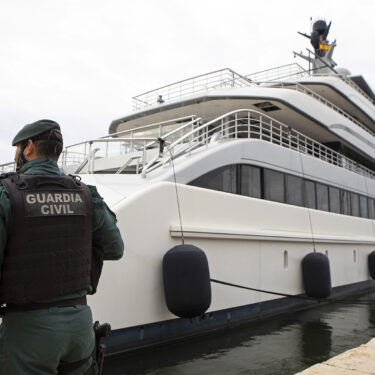
By Michael Balsamo, Aritz Parra and Francisco Ubilla
Lead Department of Justice reporter Michael Balsamo, Madrid chief correspondent Aritz Parra and freelance multiformat journalist Francisco Ubilla put the AP so far ahead on the seizure of a Russian oligarch’s yacht in Spain, competitors didn’t catch up until hours later — and they still had to use AP visuals to accompany their stories.
As part of AP’s broader coverage of the war in Ukraine, Balsamo had been examining what the federal government was doing to seize the assets of Russian oligarchs with ties to Russian President Vladimir Putin. Well-sourced Balsamo got his break when he was tipped that U.S. authorities were working with their counterparts in Spain to seize a $120 million yacht — almost as long as a football field — belonging to a billionaire friend of Putin.
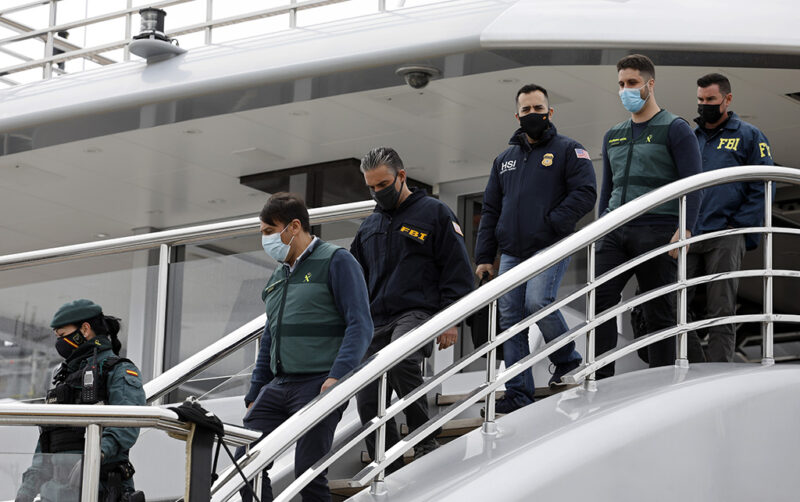
Balsamo immediately alerted colleagues in Europe and eventually Spain. Parra joined in the hunt and confirmed more information on when the seizure would take place and which yacht was being targeted. That put Ubilla on the scene reporting and making images as authorities boarded the ship,giving AP a front row seat to the first U.S. seizure of an oligarch’s yacht since the U.S. assembled a task force known as REPO — short for Russian Elites,Proxies and Oligarchs — as an effort to enforce sanctions after Russia invaded Ukraine.
The all-formats piece was one of AP’s most-read stories of the day; it was hours before competitors could report the basics using the federal government’s press announcement. Even then they still had to rely on Ubilla’s images,which played widely in broadcast, print and online.
Submission Links
By The Associated Press
Apr. 15, 2022
Explore related services
Access the worlds stories at your fingertips
Related articles

A leaked trove of documents opens a rare window into Chinese hacking practices
Mar. 1, 2024
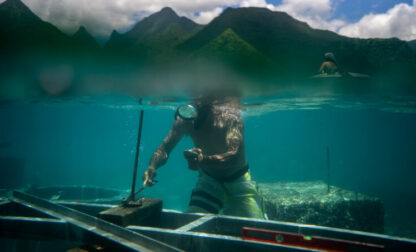
Cole captures Olympics’ impact on island life in Tahiti in stunning visuals

Persistence leads to riveting story on missing and murdered Indigenous people
- Breaking news
- Business and finance
- Entertainment
- Religion and faith
- AP Newsroom
- AP Stylebook
- AP StoryShare
- Live & location
- AP Productions
- Branded content and advertising
- Workflow Solutions
- AP’s local news AI initiative
- Metadata services
- AP Daybooks
- How AP counts the vote
- How we declare winners
- AP VoteCast: how we survey the electorate
- By industry
- Awards and recognition
- Media center
- News values
- Supporting AP
- Corporate Archives
- AP Customer Zone

Sanctions against Moscow backfire? US spent $20mn to maintain superyacht seized from Russian oligarch
A super yacht which was seized from a sanctioned Russian oligarch has cost the American taxpayers a total of $20 million and nearly $1 million per month to maintain, recent court filings showed. This comes as the war in Ukraine rages on and Kyiv’s Western allies, including the United States, have imposed thousands of sanctions against Russia in response.
About the Russian oligarch’s superyacht
The US Department of Justice has sought permission to sell the 348-foot yacht called Amadea which was seized in 2022. Estimated at a price of around $300 million, the superyacht was allegedly owned by Russian billionaire Suleiman Kerimov.
WATCH | 'Any war is a tragedy', says Russian President Putin as Ukraine war enters third year
Kerimov was sanctioned by the US Treasury Department in 2014 and again in 2018 in response to Russia’s activities in Syria and Ukraine.
The US government has sought to sell the mega-yacht, which is currently docked in San Diego, for $230 million due to the “excessive costs” of the maintenance and crew which can be as high as $922,000 a month.
According to the court documents, monthly costs for Amadea include $600,000 per month in running costs; $360,000 for the crew; $75,000 for fuel; and $165,000 for maintenance.
The ship also requires an additional $144,000 in insurance and the occasional one-off fees to cover dry docking expenses which add another $178,000 to the monthly bill.
Also Read | Two Filipino nationals among three killed in Houthi missile attack in Gulf of Aden
“It is excessive for taxpayers to pay nearly a million dollars per month to maintain the Amadea when these expenses could be reduced to zero through sale,” the US prosecutors argued in the court filing.
In previous court filings, prosecutors have also said that these maintenance payments are essential to preserving the yacht’s value.
Battle over Amadea
The US government has tried to previously get rid of the yacht but the efforts to auction it have been challenged by Eduard Khudainatov, who led the Russian state oil and gas company Rosneft from 2010 to 2013.
Khudainatov who has claimed ownership of the Amadea said that it cannot be forfeited because he has not been sanctioned. However, in previous court filings, prosecutors have alleged that he is acting as the superyacht’s “straw owner” to disguise Kerimov’s role.
However, the Russian oligarch’s lawyers have argued that the motion to sell the vessel was “premature” and urged the judge to decline it till the court “determines whether the seizure was unconstitutional.”
Also Read | US lawmakers introduce bill targeting TikTok over national security concerns
The court battle over Amadea highlights the financial and legal challenges of the sanctions imposed by the US which also involves seizing and selling assets owned by Russian oligarchs. If the US government succeeds, they would likely eventually transfer sale proceeds to support Ukraine.
European Commission President Ursula von der Leyen, last week suggested something similar saying that the EU should use profits from more than $200 billion of frozen Russian assets to fund Ukraine’s war effort.
(With inputs from agencies)
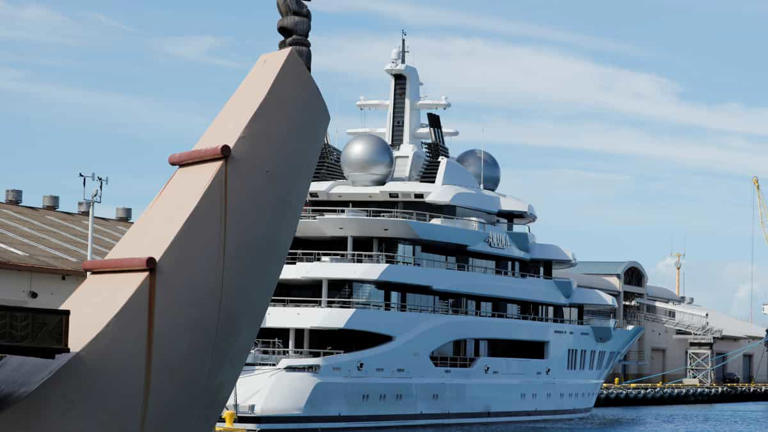

IMAGES
COMMENTS
Mar 18, 2022, 6:59 PM PDT Sanctions targeting Russian oligarchs threaten their luxury assets — including their mega yachts. Many countries have implemented sanctions targeting Putin and...
As part of an international pressure campaign on Russia, authorities from around the world have seized more than a half-dozen superyachts belonging to billionaire oligarchs allied with Russian...
PALMA DE MALLORCA, Spain — The U.S. government seized a mega yacht in Spain owned by an oligarch with close ties to the Russian president on Monday, the first in the government's sanctions...
November 20, 20228:45 AM ET Heard on Weekend Edition Sunday Ayesha Rascoe 4-Minute Listen Playlist Ayesha Rascoe speaks with Stephanie Baker, senior writer at Bloomberg News, about the...
The EU's sanctions on Russian oligarchs on Wednesday led to Germany's freezing of a yacht owned by Alisher Usmanov, one of the wealthiest Russians, according to a Forbes report. According to...
Hong Kong CNN —. A megayacht linked to a sanctioned Russian oligarch has dropped anchor in Hong Kong, amid efforts by the West to seize the luxury assets of Russian elites in allied ports as the ...
A $325 million superyacht seized by the United States from a sanctioned Russian oligarch arrived in San Diego Bay on Monday. The 348-foot-long (106-meter-long) Amadea flew an American flag as...
Russian oligarch's $300 million mega-yacht, the Amadea, seized in Fiji By Graham Kates Updated on: May 5, 2022 / 11:34 AM EDT / CBS News Fijian officials have seized a massive...
The U.S. Justice Department is taking steps to seize the Madame Gu, a 324-foot luxury yacht, but it will be diplomatically thorny. The Madame Gu, a superyacht linked to Russian billionaire and ...
Russian oligarch's yacht costs U.S. taxpayers close to $1 million a month The Justice Department is seeking permission to sell a 348-foot yacht called Amadea, which it seized in 2022....
Russian Oligarchs Russia-Ukraine War Ukraine Conflict Luxury Every Russian Oligarch Yacht Seized So Far—In Pictures Published Mar 17, 2022 at 2:04 PM EDT Updated Mar 29, 2022 at 11:11 AM...
Biden is vowing to seize Russian oligarchs' yachts. Here's where they are right now By Casey Tolan, Curt Devine and Daniel A. Medina, CNN 10 minute read Updated 6:28 AM EST, Fri March 4,...
A megayacht belonging to Russian oligarch Andrey Melnichenko was seized by Italian authorities on Friday, CNN reported. A statement from Italy's finance police said the yacht, known as SY A...
The 'Motor Yacht A' belongs to Andrey Melnichenko, an oligarch worth some $23.5 billion, according to Forbes. He once ran the fertilizer producer Eurochem and SUEK, one the the world's largest ...
Photo Illustration: Alexander Hotz. U.S. and Spanish authorities seized a $90 million super yacht in Spain that they said is owned by a sanctioned oligarch with close ties to Russian President ...
Italy's financial police force seized a €530-million superyacht belonging to Russian oligarch Andrey Igorevich Melnichenko, a spokesperson for the Italian government said today. The vessel was seized on Friday in the northeastern port of Trieste. Called "SY A," it is among the world's largest. Melnichenko is one of the oligarchs ...
Here's what it means to be an oligarch 01:31. Fiji's High Court on Tuesday ruled that a massive Russian-owned yacht can be seized by U.S. authorities.. American and Fijian officials claim the ...
A mega-yacht seized by U.S. authorities from a Russian oligarch is costing the government nearly $1 million a month to maintain, according to new court filings. The Justice Department is seeking ...
Photo by AP Photo/Francisco Ubilla. The U.S. just seized its first mega-yacht from a Russian oligarch since the war began. U.S. and Spanish officials announced the seizure of 255-foot mega-yacht ...
March 3, 2022, 12:22pm. Tweet. Super yacht Dilbar, owned by Russian billionaire Alisher Usmanov, anchors alongside the cruise ship Queen Victoria on June 08, 2020 in Weymouth, United Kingdom ...
According to SuperYachtTimes.com, the Amadea has a 392,000-liter fuel tank. That works out to about 103,555 gallons, so it could cost $766,307 or so just to fill up. A $325 million 350-foot yacht ...
On Sept. 3, 2020, the staff of a $90 million yacht placed an order with a U.S. company for a set of luxury bathrobes that came to $2,624.35. For roughly two years before that, according to federal ...
As the invasion of Ukraine continues to inspire international condemnation, mega-yachts linked to Vladimir Putin, his billionaire allies, and other prominent Russian businessmen have embarked on journeys towards waters where they're out of reach of US and EU jurisdiction.. The trips come as nations like the UK say they're considering sanctioning or seizing a "hit list" of these ...
That put Ubilla on the scene reporting and making images as authorities boarded the ship,giving AP a front row seat to the first U.S. seizure of an oligarch's yacht since the U.S. assembled a task force known as REPO — short for Russian Elites,Proxies and Oligarchs — as an effort to enforce sanctions after Russia invaded Ukraine.
About the Russian oligarch's superyacht. ... The US government has sought to sell the mega-yacht, which is currently docked in San Diego, for $230 million due to the "excessive costs" of the ...